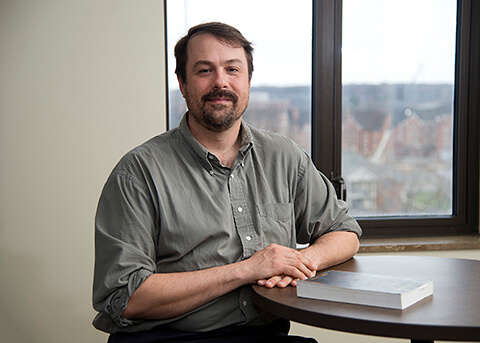Exceptional Early Career Award: Mike Yough
April 21, 2015
 |
|
Mike Yough, recipient of the 2015 Exceptional Early Career Award and clinical assistant professor of educational studies. (Purdue University photo/Mark Simons) |
In recognition of outstanding undergraduate teaching, two pre-tenure professors recently received the 2015 Exceptional Early Career Award for tenure-track faculty. This Q&A focuses on award recipient Mike Yough, clinical assistant professor of educational studies.
Years at Purdue: 4
Teaching interests: Psychology in educational contexts (e.g., learning, motivation, development, assessment) and research methods.
What Yough enjoys most about teaching: There are many things I enjoy about teaching, but perhaps the most rewarding moments are when students stay after class or come to office hours to chat because the material we covered resonated with them in some way -- perhaps a connection that enables them to better understand an experience they had as a middle school student or a new insight they gained about learning and motivation. Moments like these let me know that I'm on the right track.
I feel privileged in that moments like these are not uncommon. Our education students at Purdue are a great group -- they are generally here to truly learn so that they can be the best teachers possible. These are people who are choosing to make a difference in the lives of others. They are making this choice aware that the profession is under-esteemed, demeaned by the media and politicians, and knowing their pay is not going to reflect their level of education or expertise. And they choose this profession anyway. It's truly rewarding and an honor to play a role in the education of such students.
On using iClickers in his classroom and preparing online lectures with Camtasia: I'm drawn to trying different strategies to increase student engagement, but that doesn't necessarily mean using emerging technologies. While I think it's critically important to base teaching approaches on practices that are supported by data, I also believe it's important to model for my education students a willingness to try different approaches -- and then to collect data on the different things I'm trying.
If the results indicate what I'm trying is not effective, then I have no problem abandoning the practice or strategy. My students are no strangers to completing surveys! And, to be honest, I like to try different things simply because helps to keep things "fresh." The last thing I want to do is to fall into a rut. Students pick up on this, and it makes no one happy.
How student feedback plays a role in his course design: Student feedback plays a very important role in the design of my courses -- and that includes seeking and the using information far beyond the end-of-the-semester evaluations. As I mentioned, the research data we collect helps to shape the design of the course, but I also have no qualms about sending surveys out anytime there's a question about something I'm doing. For example, a few years ago there was a question as to whether "principal orientations" were a necessary part of students' field experiences. Turns out they were, so we kept them.
The college also collects data via program "exit surveys." The first time I saw one of these reports, I was struck by what completers had to say about the benefits of their field experiences, so I crafted surveys for our students. This led to increasing the quantity and quality of time students spent in the field. Subsequent surveys revealed that students felt the changes resulted in getting a more complete picture of the teaching profession and a greater opportunity to observe more teaching tasks.
Teaching principles he hopes his students will use in their own classrooms: I would be very happy if my students would go on to be educators who viewed all learners as capable of developing and learning. I cringe every time I hear someone referred to as "stupid" as the term implies some sort of fixed state, and I find it exceptionally troubling when I hear a "teacher" use this term. Similarly, I would hope that my students would be teachers that would first consider situational factors that may be contributing to a student's learning and motivation.
Our default is to blame students or others for undesirable behavior or lack of progress -- to see them as "stupid" or "lazy." It's much easier to do this than to take a closer look at our practices or other contextual variables that may be contributing to these outcomes. My hope is that my students would be practitioners who consider the larger picture.
On being named an Exceptional Early Career Award recipient: It is truly a humbling experience to receive this type of recognition. I'm only at this place because of the great teachers I've had in my life, excellent preparation as a graduate student, supportive mentors here at Purdue (e.g., previous Murphy winners in our college), super teaching assistants, and, of course, inquiring and engaged students.
What his students say: Mike is a passionate instructor who knows his subject material. He promotes understanding and application of subject materials rather than rote memorization. He incorporates student ideas into class discussions and values the input of students. When we made suggestions for improvement of the course, he took them into consideration and implemented a few of them. … He does a great job of making sure everyone is aware of what is expected of them in class, and also does a great job of explaining information. He really is just an amazing teacher!

